BMP6003 International HRM Report: Cultural Issues in Global Expansion
VerifiedAdded on 2023/01/05
|10
|3222
|22
Report
AI Summary
This report delves into the intricacies of International Human Resource Management (IHRM), particularly focusing on the cultural challenges encountered by UK companies during global expansion. It highlights the core aspects of IHRM, including recruitment, training, and performance management, while emphasizing the significance of cross-cultural understanding. The report specifically examines the cultural issues arising from UK companies expanding into Japan, such as differing work ethics, leadership styles, and communication barriers. It contrasts the Japanese emphasis on detail, pre-determined work, long working hours, and autocratic leadership with the more casual, individualistic approach of the UK. The report also discusses the potential advantages of navigating these cultural differences, such as effective decision-making and problem-solving. Furthermore, it addresses broader IHRM issues like cultural diversity, compensation and benefits, training and development, and the challenges of managing regional and global strategies, including the impact of overtime working in Japan. The report underscores the crucial role of IHRM in managing the workforce, providing training, and fostering effective cross-cultural communication to ensure successful global operations.
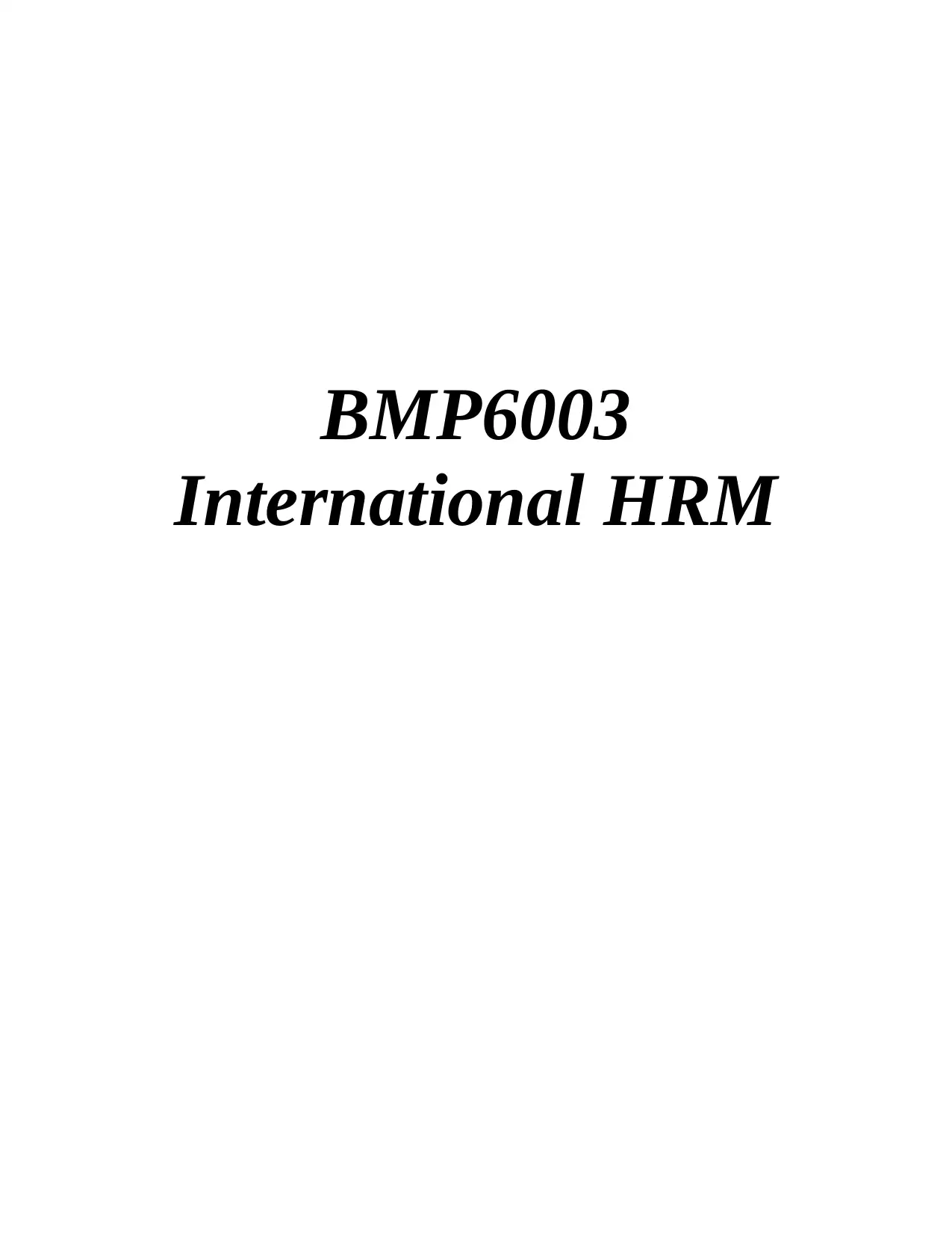
BMP6003
International HRM
International HRM
Paraphrase This Document
Need a fresh take? Get an instant paraphrase of this document with our AI Paraphraser
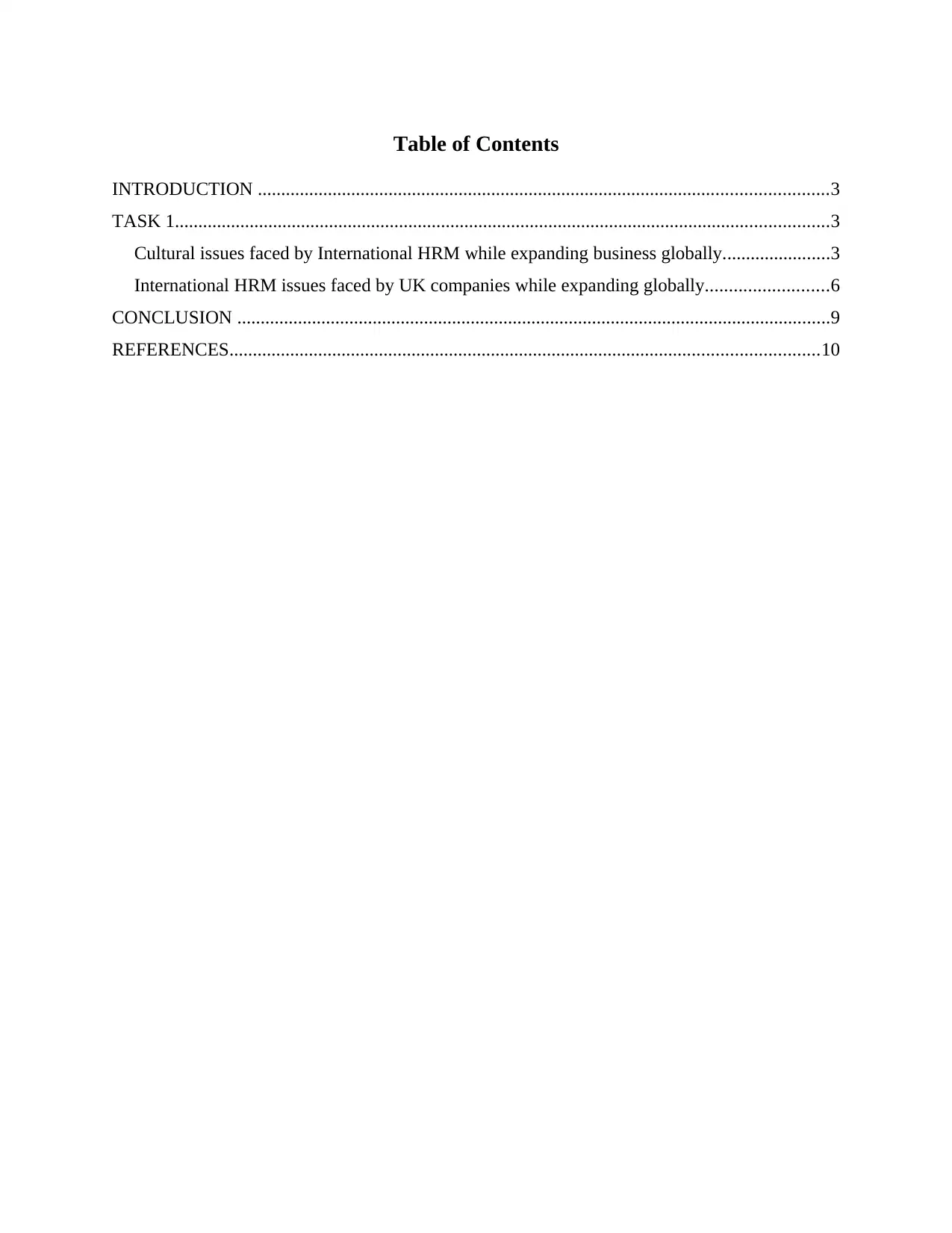
Table of Contents
INTRODUCTION ..........................................................................................................................3
TASK 1............................................................................................................................................3
Cultural issues faced by International HRM while expanding business globally.......................3
International HRM issues faced by UK companies while expanding globally..........................6
CONCLUSION ...............................................................................................................................9
REFERENCES..............................................................................................................................10
INTRODUCTION ..........................................................................................................................3
TASK 1............................................................................................................................................3
Cultural issues faced by International HRM while expanding business globally.......................3
International HRM issues faced by UK companies while expanding globally..........................6
CONCLUSION ...............................................................................................................................9
REFERENCES..............................................................................................................................10
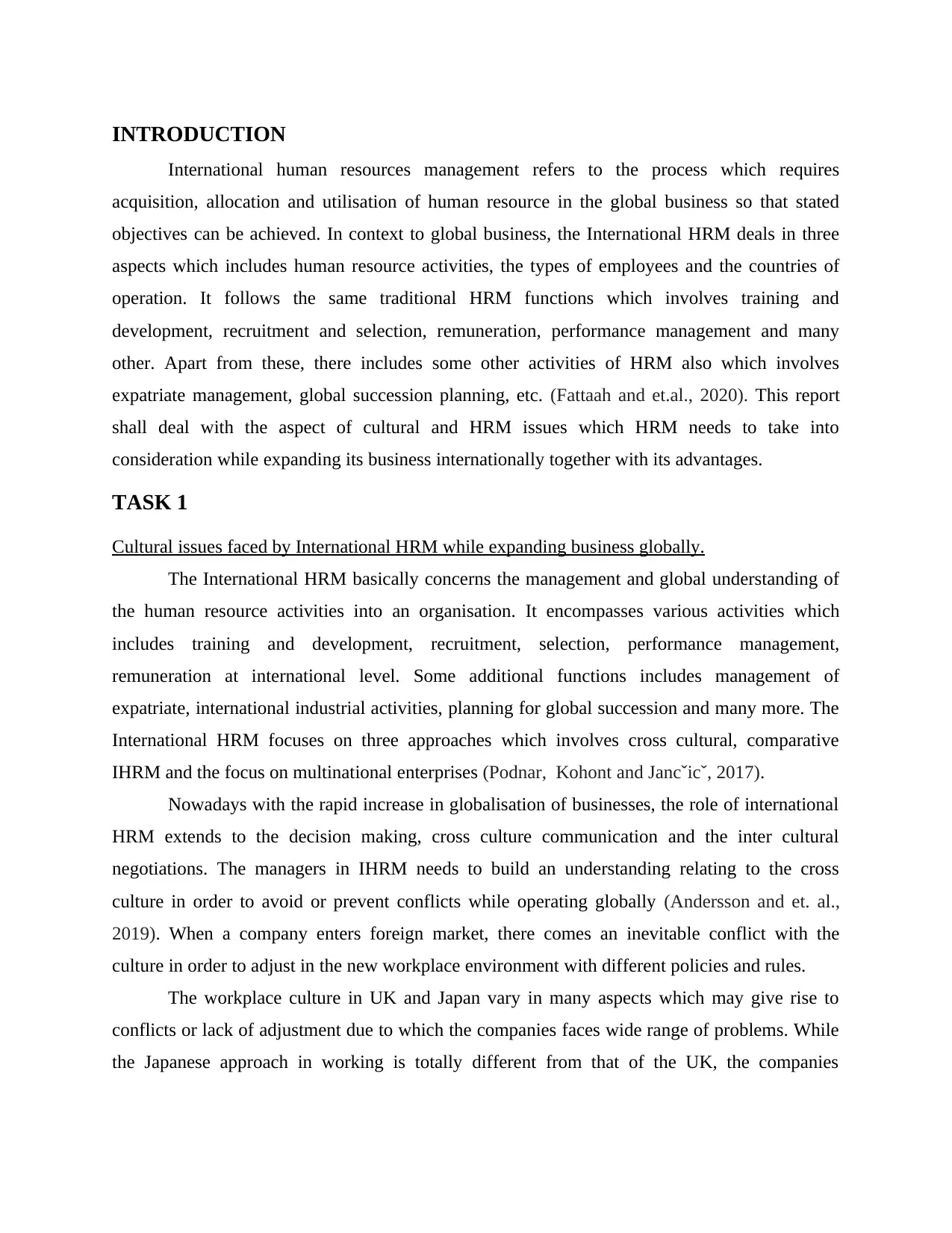
INTRODUCTION
International human resources management refers to the process which requires
acquisition, allocation and utilisation of human resource in the global business so that stated
objectives can be achieved. In context to global business, the International HRM deals in three
aspects which includes human resource activities, the types of employees and the countries of
operation. It follows the same traditional HRM functions which involves training and
development, recruitment and selection, remuneration, performance management and many
other. Apart from these, there includes some other activities of HRM also which involves
expatriate management, global succession planning, etc. (Fattaah and et.al., 2020). This report
shall deal with the aspect of cultural and HRM issues which HRM needs to take into
consideration while expanding its business internationally together with its advantages.
TASK 1
Cultural issues faced by International HRM while expanding business globally.
The International HRM basically concerns the management and global understanding of
the human resource activities into an organisation. It encompasses various activities which
includes training and development, recruitment, selection, performance management,
remuneration at international level. Some additional functions includes management of
expatriate, international industrial activities, planning for global succession and many more. The
International HRM focuses on three approaches which involves cross cultural, comparative
IHRM and the focus on multinational enterprises (Podnar, Kohont and Jancˇicˇ, 2017).
Nowadays with the rapid increase in globalisation of businesses, the role of international
HRM extends to the decision making, cross culture communication and the inter cultural
negotiations. The managers in IHRM needs to build an understanding relating to the cross
culture in order to avoid or prevent conflicts while operating globally (Andersson and et. al.,
2019). When a company enters foreign market, there comes an inevitable conflict with the
culture in order to adjust in the new workplace environment with different policies and rules.
The workplace culture in UK and Japan vary in many aspects which may give rise to
conflicts or lack of adjustment due to which the companies faces wide range of problems. While
the Japanese approach in working is totally different from that of the UK, the companies
International human resources management refers to the process which requires
acquisition, allocation and utilisation of human resource in the global business so that stated
objectives can be achieved. In context to global business, the International HRM deals in three
aspects which includes human resource activities, the types of employees and the countries of
operation. It follows the same traditional HRM functions which involves training and
development, recruitment and selection, remuneration, performance management and many
other. Apart from these, there includes some other activities of HRM also which involves
expatriate management, global succession planning, etc. (Fattaah and et.al., 2020). This report
shall deal with the aspect of cultural and HRM issues which HRM needs to take into
consideration while expanding its business internationally together with its advantages.
TASK 1
Cultural issues faced by International HRM while expanding business globally.
The International HRM basically concerns the management and global understanding of
the human resource activities into an organisation. It encompasses various activities which
includes training and development, recruitment, selection, performance management,
remuneration at international level. Some additional functions includes management of
expatriate, international industrial activities, planning for global succession and many more. The
International HRM focuses on three approaches which involves cross cultural, comparative
IHRM and the focus on multinational enterprises (Podnar, Kohont and Jancˇicˇ, 2017).
Nowadays with the rapid increase in globalisation of businesses, the role of international
HRM extends to the decision making, cross culture communication and the inter cultural
negotiations. The managers in IHRM needs to build an understanding relating to the cross
culture in order to avoid or prevent conflicts while operating globally (Andersson and et. al.,
2019). When a company enters foreign market, there comes an inevitable conflict with the
culture in order to adjust in the new workplace environment with different policies and rules.
The workplace culture in UK and Japan vary in many aspects which may give rise to
conflicts or lack of adjustment due to which the companies faces wide range of problems. While
the Japanese approach in working is totally different from that of the UK, the companies
⊘ This is a preview!⊘
Do you want full access?
Subscribe today to unlock all pages.

Trusted by 1+ million students worldwide
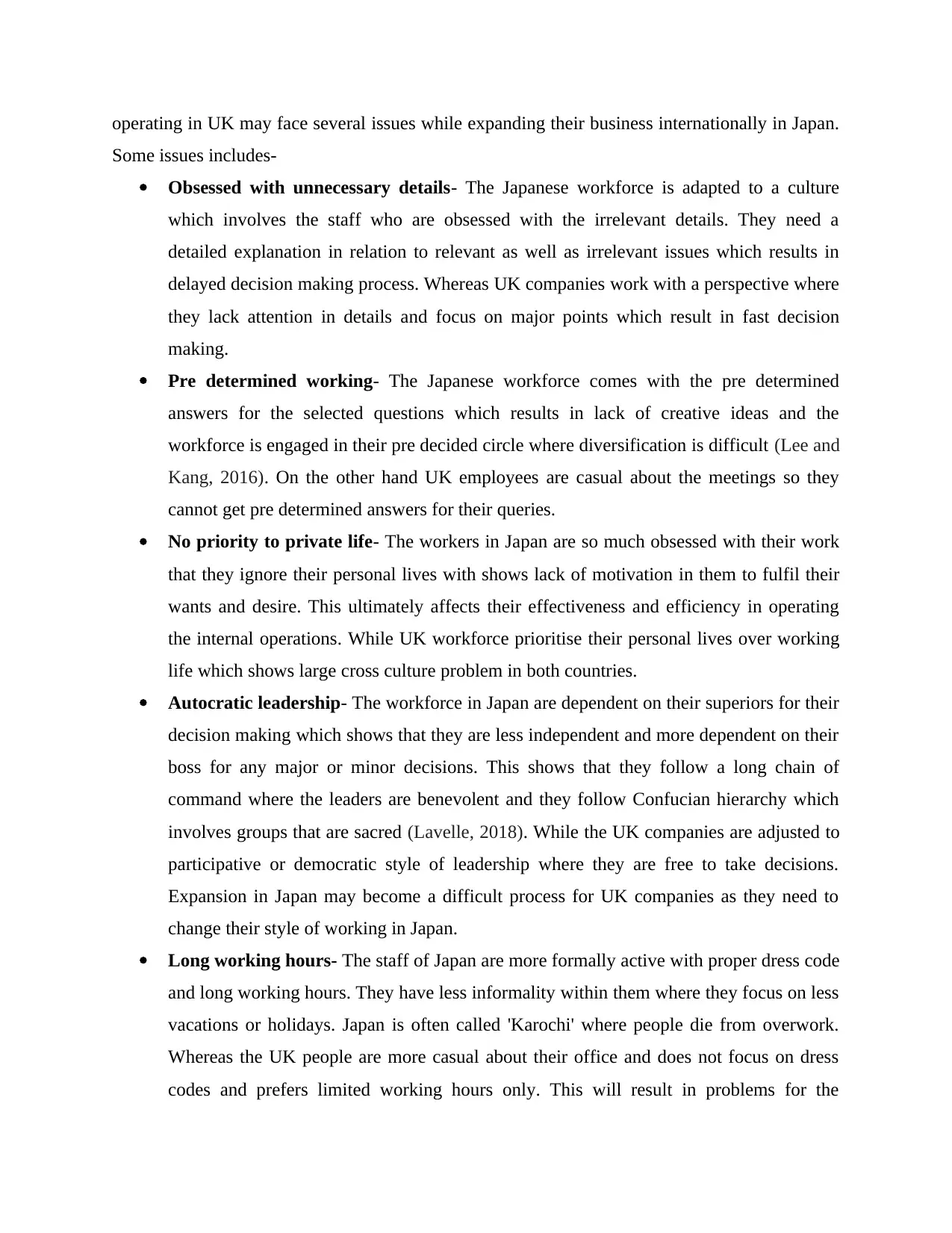
operating in UK may face several issues while expanding their business internationally in Japan.
Some issues includes-
Obsessed with unnecessary details- The Japanese workforce is adapted to a culture
which involves the staff who are obsessed with the irrelevant details. They need a
detailed explanation in relation to relevant as well as irrelevant issues which results in
delayed decision making process. Whereas UK companies work with a perspective where
they lack attention in details and focus on major points which result in fast decision
making.
Pre determined working- The Japanese workforce comes with the pre determined
answers for the selected questions which results in lack of creative ideas and the
workforce is engaged in their pre decided circle where diversification is difficult (Lee and
Kang, 2016). On the other hand UK employees are casual about the meetings so they
cannot get pre determined answers for their queries.
No priority to private life- The workers in Japan are so much obsessed with their work
that they ignore their personal lives with shows lack of motivation in them to fulfil their
wants and desire. This ultimately affects their effectiveness and efficiency in operating
the internal operations. While UK workforce prioritise their personal lives over working
life which shows large cross culture problem in both countries.
Autocratic leadership- The workforce in Japan are dependent on their superiors for their
decision making which shows that they are less independent and more dependent on their
boss for any major or minor decisions. This shows that they follow a long chain of
command where the leaders are benevolent and they follow Confucian hierarchy which
involves groups that are sacred (Lavelle, 2018). While the UK companies are adjusted to
participative or democratic style of leadership where they are free to take decisions.
Expansion in Japan may become a difficult process for UK companies as they need to
change their style of working in Japan.
Long working hours- The staff of Japan are more formally active with proper dress code
and long working hours. They have less informality within them where they focus on less
vacations or holidays. Japan is often called 'Karochi' where people die from overwork.
Whereas the UK people are more casual about their office and does not focus on dress
codes and prefers limited working hours only. This will result in problems for the
Some issues includes-
Obsessed with unnecessary details- The Japanese workforce is adapted to a culture
which involves the staff who are obsessed with the irrelevant details. They need a
detailed explanation in relation to relevant as well as irrelevant issues which results in
delayed decision making process. Whereas UK companies work with a perspective where
they lack attention in details and focus on major points which result in fast decision
making.
Pre determined working- The Japanese workforce comes with the pre determined
answers for the selected questions which results in lack of creative ideas and the
workforce is engaged in their pre decided circle where diversification is difficult (Lee and
Kang, 2016). On the other hand UK employees are casual about the meetings so they
cannot get pre determined answers for their queries.
No priority to private life- The workers in Japan are so much obsessed with their work
that they ignore their personal lives with shows lack of motivation in them to fulfil their
wants and desire. This ultimately affects their effectiveness and efficiency in operating
the internal operations. While UK workforce prioritise their personal lives over working
life which shows large cross culture problem in both countries.
Autocratic leadership- The workforce in Japan are dependent on their superiors for their
decision making which shows that they are less independent and more dependent on their
boss for any major or minor decisions. This shows that they follow a long chain of
command where the leaders are benevolent and they follow Confucian hierarchy which
involves groups that are sacred (Lavelle, 2018). While the UK companies are adjusted to
participative or democratic style of leadership where they are free to take decisions.
Expansion in Japan may become a difficult process for UK companies as they need to
change their style of working in Japan.
Long working hours- The staff of Japan are more formally active with proper dress code
and long working hours. They have less informality within them where they focus on less
vacations or holidays. Japan is often called 'Karochi' where people die from overwork.
Whereas the UK people are more casual about their office and does not focus on dress
codes and prefers limited working hours only. This will result in problems for the
Paraphrase This Document
Need a fresh take? Get an instant paraphrase of this document with our AI Paraphraser
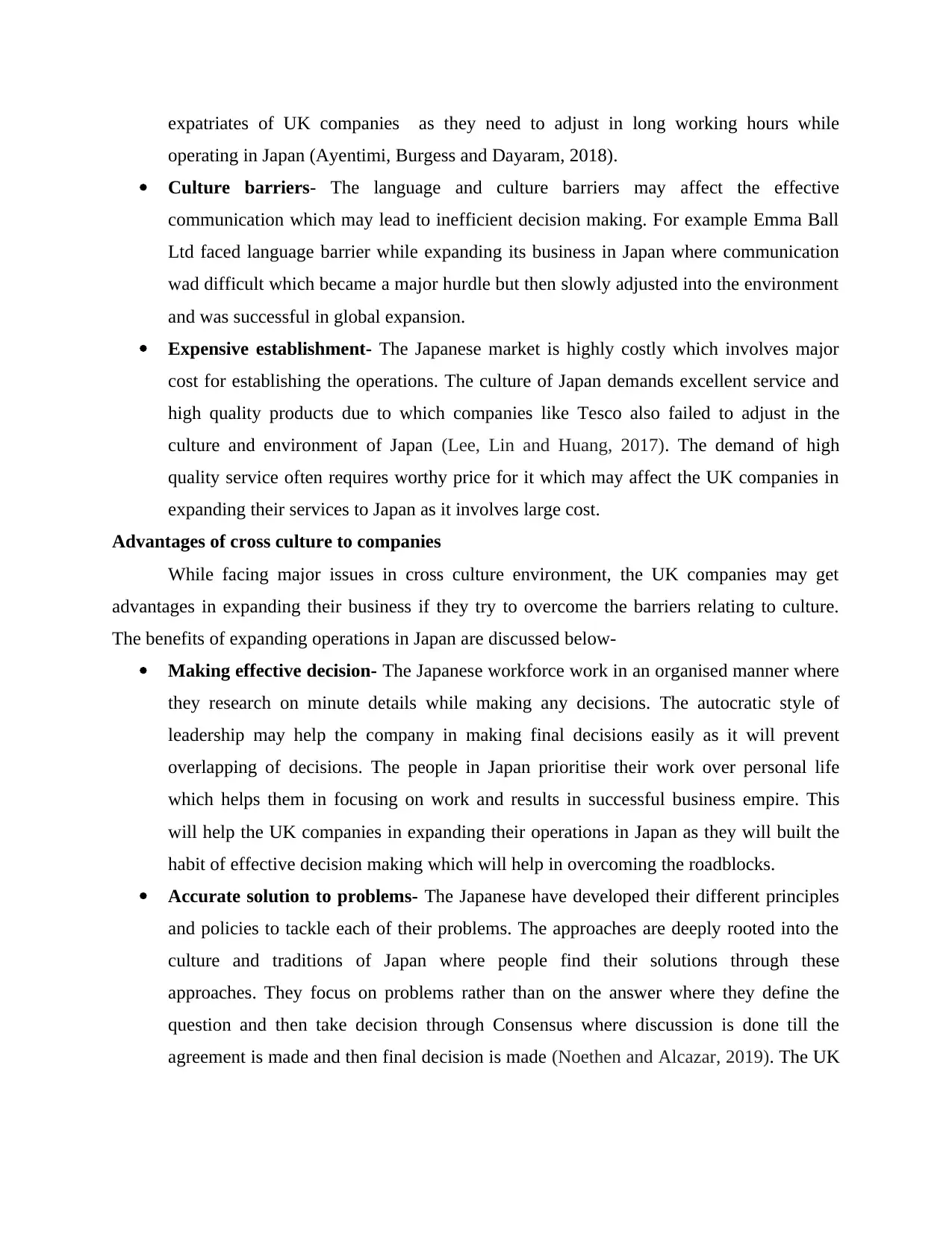
expatriates of UK companies as they need to adjust in long working hours while
operating in Japan (Ayentimi, Burgess and Dayaram, 2018).
Culture barriers- The language and culture barriers may affect the effective
communication which may lead to inefficient decision making. For example Emma Ball
Ltd faced language barrier while expanding its business in Japan where communication
wad difficult which became a major hurdle but then slowly adjusted into the environment
and was successful in global expansion.
Expensive establishment- The Japanese market is highly costly which involves major
cost for establishing the operations. The culture of Japan demands excellent service and
high quality products due to which companies like Tesco also failed to adjust in the
culture and environment of Japan (Lee, Lin and Huang, 2017). The demand of high
quality service often requires worthy price for it which may affect the UK companies in
expanding their services to Japan as it involves large cost.
Advantages of cross culture to companies
While facing major issues in cross culture environment, the UK companies may get
advantages in expanding their business if they try to overcome the barriers relating to culture.
The benefits of expanding operations in Japan are discussed below-
Making effective decision- The Japanese workforce work in an organised manner where
they research on minute details while making any decisions. The autocratic style of
leadership may help the company in making final decisions easily as it will prevent
overlapping of decisions. The people in Japan prioritise their work over personal life
which helps them in focusing on work and results in successful business empire. This
will help the UK companies in expanding their operations in Japan as they will built the
habit of effective decision making which will help in overcoming the roadblocks.
Accurate solution to problems- The Japanese have developed their different principles
and policies to tackle each of their problems. The approaches are deeply rooted into the
culture and traditions of Japan where people find their solutions through these
approaches. They focus on problems rather than on the answer where they define the
question and then take decision through Consensus where discussion is done till the
agreement is made and then final decision is made (Noethen and Alcazar, 2019). The UK
operating in Japan (Ayentimi, Burgess and Dayaram, 2018).
Culture barriers- The language and culture barriers may affect the effective
communication which may lead to inefficient decision making. For example Emma Ball
Ltd faced language barrier while expanding its business in Japan where communication
wad difficult which became a major hurdle but then slowly adjusted into the environment
and was successful in global expansion.
Expensive establishment- The Japanese market is highly costly which involves major
cost for establishing the operations. The culture of Japan demands excellent service and
high quality products due to which companies like Tesco also failed to adjust in the
culture and environment of Japan (Lee, Lin and Huang, 2017). The demand of high
quality service often requires worthy price for it which may affect the UK companies in
expanding their services to Japan as it involves large cost.
Advantages of cross culture to companies
While facing major issues in cross culture environment, the UK companies may get
advantages in expanding their business if they try to overcome the barriers relating to culture.
The benefits of expanding operations in Japan are discussed below-
Making effective decision- The Japanese workforce work in an organised manner where
they research on minute details while making any decisions. The autocratic style of
leadership may help the company in making final decisions easily as it will prevent
overlapping of decisions. The people in Japan prioritise their work over personal life
which helps them in focusing on work and results in successful business empire. This
will help the UK companies in expanding their operations in Japan as they will built the
habit of effective decision making which will help in overcoming the roadblocks.
Accurate solution to problems- The Japanese have developed their different principles
and policies to tackle each of their problems. The approaches are deeply rooted into the
culture and traditions of Japan where people find their solutions through these
approaches. They focus on problems rather than on the answer where they define the
question and then take decision through Consensus where discussion is done till the
agreement is made and then final decision is made (Noethen and Alcazar, 2019). The UK

companies will get benefited with this culture where problems are taken seriously to
reach the accurate solution .
Cheap labour- The workforce in Japan are cost effective as compared to UK where the
company, if expanding in Japan shall have the skilled employee in low wages. This will
help the company in utilising the labour for the company's success in cost effective
manner.
Lifetime Training sessions- The Japanese culture focuses on continuous training where
it is believed that once training is stopped it may result in downfall of the skill or
creativity. The burden of improving the skills and knowledge lies on the participant who
is being trained. The training in Japan is given to the staff until it reaches standard of its
performance from the learner. The Japan has a standard for every job and the companies
are required to train the employee until it reaches on its plateau but makes its
involvement in the training programs (Noethen and Alcazar, 2019).
Role of IHRM
The international HRM must try to manage its domestic workforce in such a manner that
they are able to adjust in the environment. The cultural differences may cause professional
misunderstanding which becomes a challenge for the IHRM. There must be appropriate training
to the staff (expatriate) in relation to culture and language so that they can coordinate with the
foreign employees and can overcome the cultural barrier. The recruitment in the company must
be done in such a manner that the organisation is able to utilise its workforce for the benefit of
the company by retaining the staff into the organisation and help the expatriate in adjusting in
different culture. Motivation must be given to the employees in order to manage the staff in the
cross culture environment so that they can give their best in adjusting into the culture.
International HRM issues faced by UK companies while expanding globally.
The human resource of an organisation is the real asset which contributes to the success
of the organisation. The Human resource management is a continuous practice which involves
management of employees for the better performance. It requires practices which includes
staffing, developing, compensation, training and employer-employee relations.
While a business is expanded globally in different country from the domestic, it involves
the role of International HRM which undertakes the role of organising or managing the human
resource at international level (Rowlands and Iles, 2017). The impact of global business may be
reach the accurate solution .
Cheap labour- The workforce in Japan are cost effective as compared to UK where the
company, if expanding in Japan shall have the skilled employee in low wages. This will
help the company in utilising the labour for the company's success in cost effective
manner.
Lifetime Training sessions- The Japanese culture focuses on continuous training where
it is believed that once training is stopped it may result in downfall of the skill or
creativity. The burden of improving the skills and knowledge lies on the participant who
is being trained. The training in Japan is given to the staff until it reaches standard of its
performance from the learner. The Japan has a standard for every job and the companies
are required to train the employee until it reaches on its plateau but makes its
involvement in the training programs (Noethen and Alcazar, 2019).
Role of IHRM
The international HRM must try to manage its domestic workforce in such a manner that
they are able to adjust in the environment. The cultural differences may cause professional
misunderstanding which becomes a challenge for the IHRM. There must be appropriate training
to the staff (expatriate) in relation to culture and language so that they can coordinate with the
foreign employees and can overcome the cultural barrier. The recruitment in the company must
be done in such a manner that the organisation is able to utilise its workforce for the benefit of
the company by retaining the staff into the organisation and help the expatriate in adjusting in
different culture. Motivation must be given to the employees in order to manage the staff in the
cross culture environment so that they can give their best in adjusting into the culture.
International HRM issues faced by UK companies while expanding globally.
The human resource of an organisation is the real asset which contributes to the success
of the organisation. The Human resource management is a continuous practice which involves
management of employees for the better performance. It requires practices which includes
staffing, developing, compensation, training and employer-employee relations.
While a business is expanded globally in different country from the domestic, it involves
the role of International HRM which undertakes the role of organising or managing the human
resource at international level (Rowlands and Iles, 2017). The impact of global business may be
⊘ This is a preview!⊘
Do you want full access?
Subscribe today to unlock all pages.

Trusted by 1+ million students worldwide
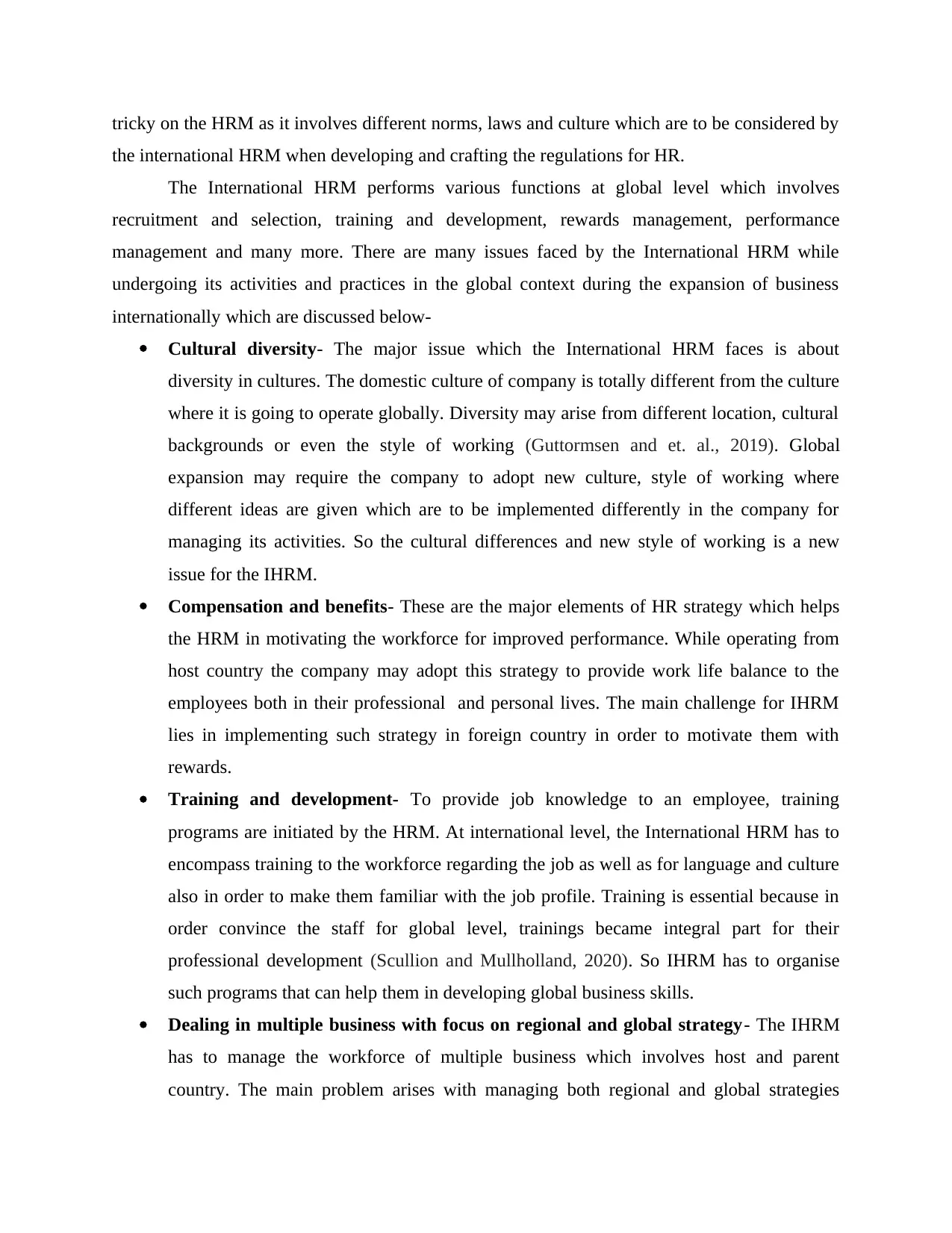
tricky on the HRM as it involves different norms, laws and culture which are to be considered by
the international HRM when developing and crafting the regulations for HR.
The International HRM performs various functions at global level which involves
recruitment and selection, training and development, rewards management, performance
management and many more. There are many issues faced by the International HRM while
undergoing its activities and practices in the global context during the expansion of business
internationally which are discussed below-
Cultural diversity- The major issue which the International HRM faces is about
diversity in cultures. The domestic culture of company is totally different from the culture
where it is going to operate globally. Diversity may arise from different location, cultural
backgrounds or even the style of working (Guttormsen and et. al., 2019). Global
expansion may require the company to adopt new culture, style of working where
different ideas are given which are to be implemented differently in the company for
managing its activities. So the cultural differences and new style of working is a new
issue for the IHRM.
Compensation and benefits- These are the major elements of HR strategy which helps
the HRM in motivating the workforce for improved performance. While operating from
host country the company may adopt this strategy to provide work life balance to the
employees both in their professional and personal lives. The main challenge for IHRM
lies in implementing such strategy in foreign country in order to motivate them with
rewards.
Training and development- To provide job knowledge to an employee, training
programs are initiated by the HRM. At international level, the International HRM has to
encompass training to the workforce regarding the job as well as for language and culture
also in order to make them familiar with the job profile. Training is essential because in
order convince the staff for global level, trainings became integral part for their
professional development (Scullion and Mullholland, 2020). So IHRM has to organise
such programs that can help them in developing global business skills.
Dealing in multiple business with focus on regional and global strategy- The IHRM
has to manage the workforce of multiple business which involves host and parent
country. The main problem arises with managing both regional and global strategies
the international HRM when developing and crafting the regulations for HR.
The International HRM performs various functions at global level which involves
recruitment and selection, training and development, rewards management, performance
management and many more. There are many issues faced by the International HRM while
undergoing its activities and practices in the global context during the expansion of business
internationally which are discussed below-
Cultural diversity- The major issue which the International HRM faces is about
diversity in cultures. The domestic culture of company is totally different from the culture
where it is going to operate globally. Diversity may arise from different location, cultural
backgrounds or even the style of working (Guttormsen and et. al., 2019). Global
expansion may require the company to adopt new culture, style of working where
different ideas are given which are to be implemented differently in the company for
managing its activities. So the cultural differences and new style of working is a new
issue for the IHRM.
Compensation and benefits- These are the major elements of HR strategy which helps
the HRM in motivating the workforce for improved performance. While operating from
host country the company may adopt this strategy to provide work life balance to the
employees both in their professional and personal lives. The main challenge for IHRM
lies in implementing such strategy in foreign country in order to motivate them with
rewards.
Training and development- To provide job knowledge to an employee, training
programs are initiated by the HRM. At international level, the International HRM has to
encompass training to the workforce regarding the job as well as for language and culture
also in order to make them familiar with the job profile. Training is essential because in
order convince the staff for global level, trainings became integral part for their
professional development (Scullion and Mullholland, 2020). So IHRM has to organise
such programs that can help them in developing global business skills.
Dealing in multiple business with focus on regional and global strategy- The IHRM
has to manage the workforce of multiple business which involves host and parent
country. The main problem arises with managing both regional and global strategies
Paraphrase This Document
Need a fresh take? Get an instant paraphrase of this document with our AI Paraphraser
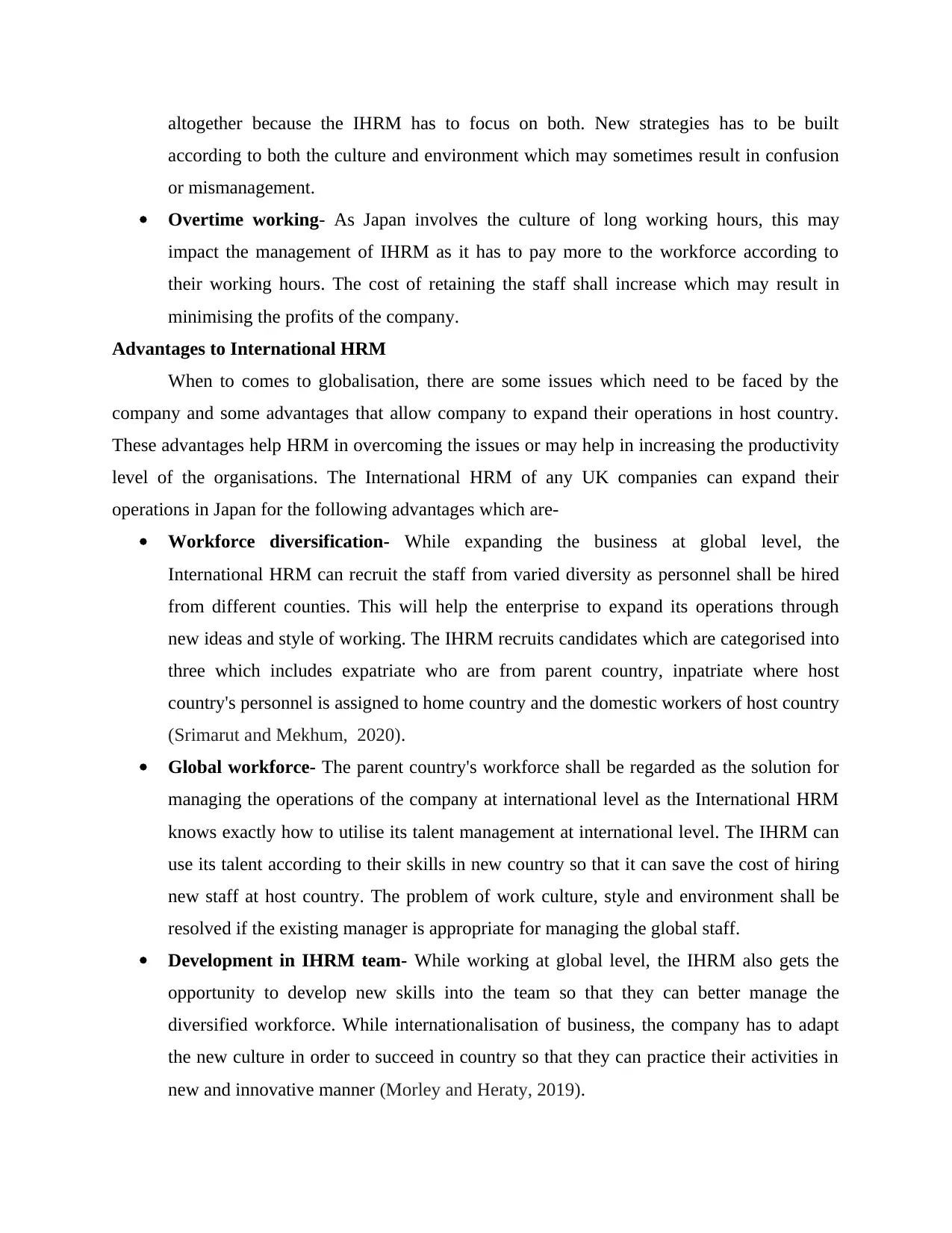
altogether because the IHRM has to focus on both. New strategies has to be built
according to both the culture and environment which may sometimes result in confusion
or mismanagement.
Overtime working- As Japan involves the culture of long working hours, this may
impact the management of IHRM as it has to pay more to the workforce according to
their working hours. The cost of retaining the staff shall increase which may result in
minimising the profits of the company.
Advantages to International HRM
When to comes to globalisation, there are some issues which need to be faced by the
company and some advantages that allow company to expand their operations in host country.
These advantages help HRM in overcoming the issues or may help in increasing the productivity
level of the organisations. The International HRM of any UK companies can expand their
operations in Japan for the following advantages which are-
Workforce diversification- While expanding the business at global level, the
International HRM can recruit the staff from varied diversity as personnel shall be hired
from different counties. This will help the enterprise to expand its operations through
new ideas and style of working. The IHRM recruits candidates which are categorised into
three which includes expatriate who are from parent country, inpatriate where host
country's personnel is assigned to home country and the domestic workers of host country
(Srimarut and Mekhum, 2020).
Global workforce- The parent country's workforce shall be regarded as the solution for
managing the operations of the company at international level as the International HRM
knows exactly how to utilise its talent management at international level. The IHRM can
use its talent according to their skills in new country so that it can save the cost of hiring
new staff at host country. The problem of work culture, style and environment shall be
resolved if the existing manager is appropriate for managing the global staff.
Development in IHRM team- While working at global level, the IHRM also gets the
opportunity to develop new skills into the team so that they can better manage the
diversified workforce. While internationalisation of business, the company has to adapt
the new culture in order to succeed in country so that they can practice their activities in
new and innovative manner (Morley and Heraty, 2019).
according to both the culture and environment which may sometimes result in confusion
or mismanagement.
Overtime working- As Japan involves the culture of long working hours, this may
impact the management of IHRM as it has to pay more to the workforce according to
their working hours. The cost of retaining the staff shall increase which may result in
minimising the profits of the company.
Advantages to International HRM
When to comes to globalisation, there are some issues which need to be faced by the
company and some advantages that allow company to expand their operations in host country.
These advantages help HRM in overcoming the issues or may help in increasing the productivity
level of the organisations. The International HRM of any UK companies can expand their
operations in Japan for the following advantages which are-
Workforce diversification- While expanding the business at global level, the
International HRM can recruit the staff from varied diversity as personnel shall be hired
from different counties. This will help the enterprise to expand its operations through
new ideas and style of working. The IHRM recruits candidates which are categorised into
three which includes expatriate who are from parent country, inpatriate where host
country's personnel is assigned to home country and the domestic workers of host country
(Srimarut and Mekhum, 2020).
Global workforce- The parent country's workforce shall be regarded as the solution for
managing the operations of the company at international level as the International HRM
knows exactly how to utilise its talent management at international level. The IHRM can
use its talent according to their skills in new country so that it can save the cost of hiring
new staff at host country. The problem of work culture, style and environment shall be
resolved if the existing manager is appropriate for managing the global staff.
Development in IHRM team- While working at global level, the IHRM also gets the
opportunity to develop new skills into the team so that they can better manage the
diversified workforce. While internationalisation of business, the company has to adapt
the new culture in order to succeed in country so that they can practice their activities in
new and innovative manner (Morley and Heraty, 2019).
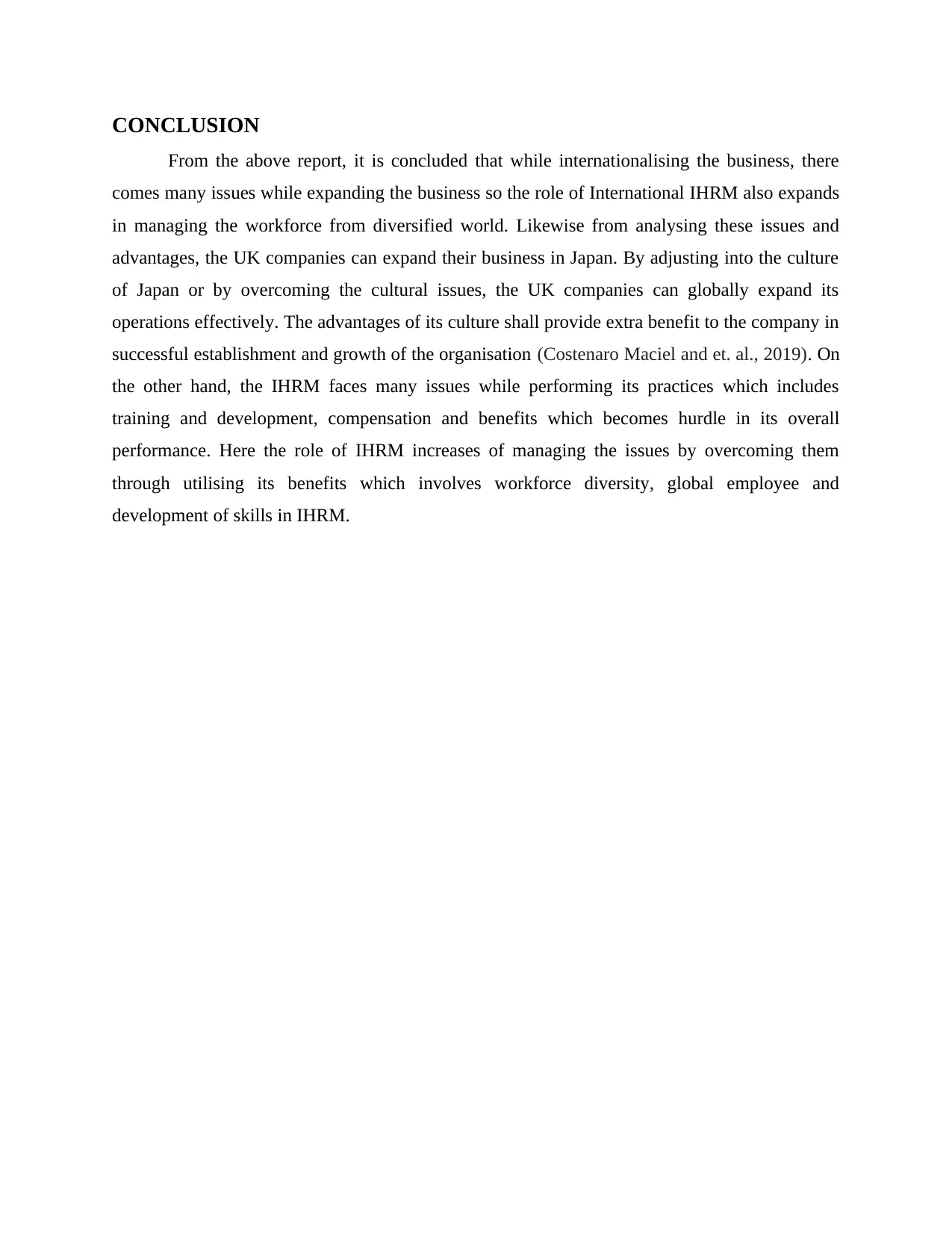
CONCLUSION
From the above report, it is concluded that while internationalising the business, there
comes many issues while expanding the business so the role of International IHRM also expands
in managing the workforce from diversified world. Likewise from analysing these issues and
advantages, the UK companies can expand their business in Japan. By adjusting into the culture
of Japan or by overcoming the cultural issues, the UK companies can globally expand its
operations effectively. The advantages of its culture shall provide extra benefit to the company in
successful establishment and growth of the organisation (Costenaro Maciel and et. al., 2019). On
the other hand, the IHRM faces many issues while performing its practices which includes
training and development, compensation and benefits which becomes hurdle in its overall
performance. Here the role of IHRM increases of managing the issues by overcoming them
through utilising its benefits which involves workforce diversity, global employee and
development of skills in IHRM.
From the above report, it is concluded that while internationalising the business, there
comes many issues while expanding the business so the role of International IHRM also expands
in managing the workforce from diversified world. Likewise from analysing these issues and
advantages, the UK companies can expand their business in Japan. By adjusting into the culture
of Japan or by overcoming the cultural issues, the UK companies can globally expand its
operations effectively. The advantages of its culture shall provide extra benefit to the company in
successful establishment and growth of the organisation (Costenaro Maciel and et. al., 2019). On
the other hand, the IHRM faces many issues while performing its practices which includes
training and development, compensation and benefits which becomes hurdle in its overall
performance. Here the role of IHRM increases of managing the issues by overcoming them
through utilising its benefits which involves workforce diversity, global employee and
development of skills in IHRM.
⊘ This is a preview!⊘
Do you want full access?
Subscribe today to unlock all pages.

Trusted by 1+ million students worldwide
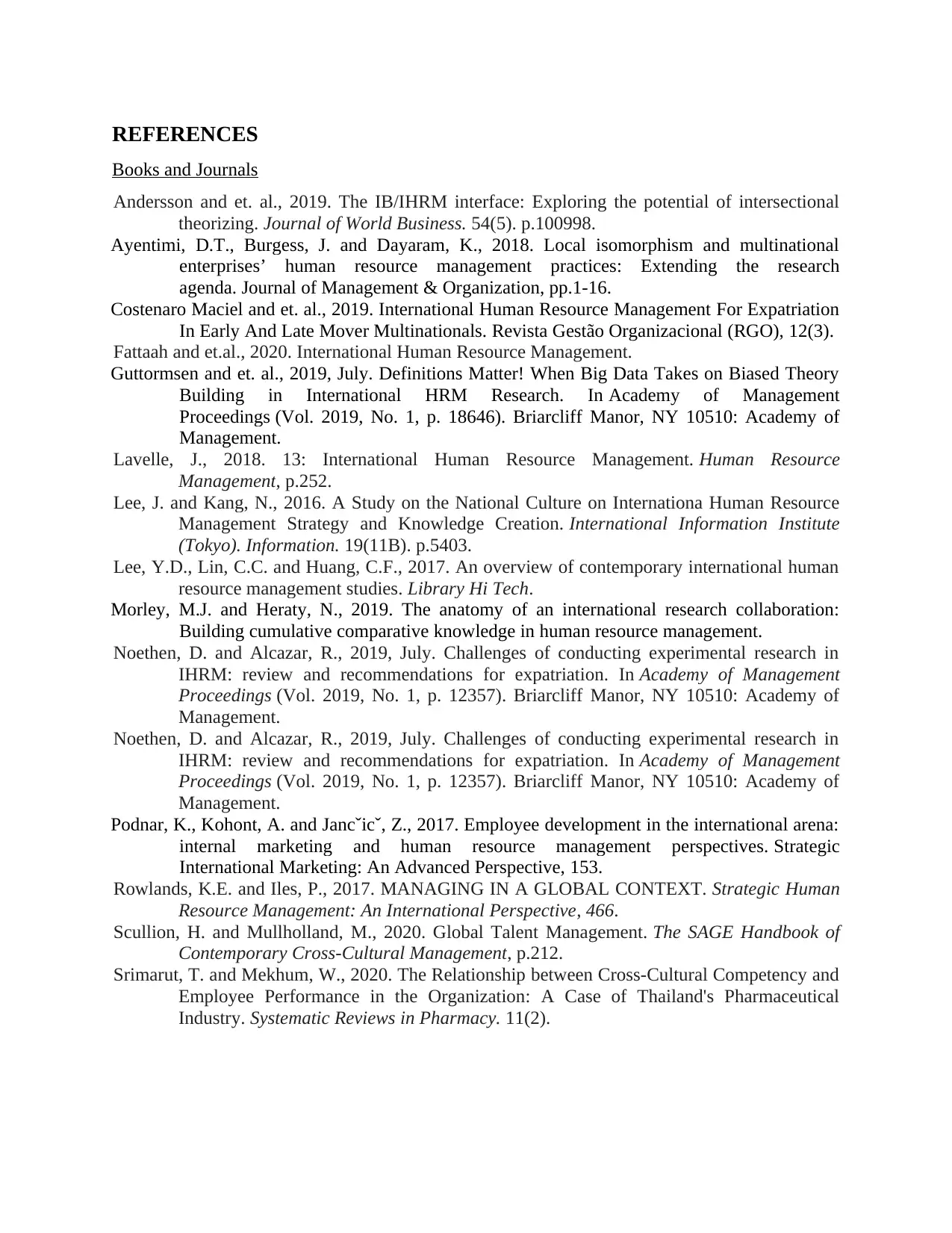
REFERENCES
Books and Journals
Andersson and et. al., 2019. The IB/IHRM interface: Exploring the potential of intersectional
theorizing. Journal of World Business. 54(5). p.100998.
Ayentimi, D.T., Burgess, J. and Dayaram, K., 2018. Local isomorphism and multinational
enterprises’ human resource management practices: Extending the research
agenda. Journal of Management & Organization, pp.1-16.
Costenaro Maciel and et. al., 2019. International Human Resource Management For Expatriation
In Early And Late Mover Multinationals. Revista Gestão Organizacional (RGO), 12(3).
Fattaah and et.al., 2020. International Human Resource Management.
Guttormsen and et. al., 2019, July. Definitions Matter! When Big Data Takes on Biased Theory
Building in International HRM Research. In Academy of Management
Proceedings (Vol. 2019, No. 1, p. 18646). Briarcliff Manor, NY 10510: Academy of
Management.
Lavelle, J., 2018. 13: International Human Resource Management. Human Resource
Management, p.252.
Lee, J. and Kang, N., 2016. A Study on the National Culture on Internationa Human Resource
Management Strategy and Knowledge Creation. International Information Institute
(Tokyo). Information. 19(11B). p.5403.
Lee, Y.D., Lin, C.C. and Huang, C.F., 2017. An overview of contemporary international human
resource management studies. Library Hi Tech.
Morley, M.J. and Heraty, N., 2019. The anatomy of an international research collaboration:
Building cumulative comparative knowledge in human resource management.
Noethen, D. and Alcazar, R., 2019, July. Challenges of conducting experimental research in
IHRM: review and recommendations for expatriation. In Academy of Management
Proceedings (Vol. 2019, No. 1, p. 12357). Briarcliff Manor, NY 10510: Academy of
Management.
Noethen, D. and Alcazar, R., 2019, July. Challenges of conducting experimental research in
IHRM: review and recommendations for expatriation. In Academy of Management
Proceedings (Vol. 2019, No. 1, p. 12357). Briarcliff Manor, NY 10510: Academy of
Management.
Podnar, K., Kohont, A. and Jancˇicˇ, Z., 2017. Employee development in the international arena:
internal marketing and human resource management perspectives. Strategic
International Marketing: An Advanced Perspective, 153.
Rowlands, K.E. and Iles, P., 2017. MANAGING IN A GLOBAL CONTEXT. Strategic Human
Resource Management: An International Perspective, 466.
Scullion, H. and Mullholland, M., 2020. Global Talent Management. The SAGE Handbook of
Contemporary Cross-Cultural Management, p.212.
Srimarut, T. and Mekhum, W., 2020. The Relationship between Cross-Cultural Competency and
Employee Performance in the Organization: A Case of Thailand's Pharmaceutical
Industry. Systematic Reviews in Pharmacy. 11(2).
Books and Journals
Andersson and et. al., 2019. The IB/IHRM interface: Exploring the potential of intersectional
theorizing. Journal of World Business. 54(5). p.100998.
Ayentimi, D.T., Burgess, J. and Dayaram, K., 2018. Local isomorphism and multinational
enterprises’ human resource management practices: Extending the research
agenda. Journal of Management & Organization, pp.1-16.
Costenaro Maciel and et. al., 2019. International Human Resource Management For Expatriation
In Early And Late Mover Multinationals. Revista Gestão Organizacional (RGO), 12(3).
Fattaah and et.al., 2020. International Human Resource Management.
Guttormsen and et. al., 2019, July. Definitions Matter! When Big Data Takes on Biased Theory
Building in International HRM Research. In Academy of Management
Proceedings (Vol. 2019, No. 1, p. 18646). Briarcliff Manor, NY 10510: Academy of
Management.
Lavelle, J., 2018. 13: International Human Resource Management. Human Resource
Management, p.252.
Lee, J. and Kang, N., 2016. A Study on the National Culture on Internationa Human Resource
Management Strategy and Knowledge Creation. International Information Institute
(Tokyo). Information. 19(11B). p.5403.
Lee, Y.D., Lin, C.C. and Huang, C.F., 2017. An overview of contemporary international human
resource management studies. Library Hi Tech.
Morley, M.J. and Heraty, N., 2019. The anatomy of an international research collaboration:
Building cumulative comparative knowledge in human resource management.
Noethen, D. and Alcazar, R., 2019, July. Challenges of conducting experimental research in
IHRM: review and recommendations for expatriation. In Academy of Management
Proceedings (Vol. 2019, No. 1, p. 12357). Briarcliff Manor, NY 10510: Academy of
Management.
Noethen, D. and Alcazar, R., 2019, July. Challenges of conducting experimental research in
IHRM: review and recommendations for expatriation. In Academy of Management
Proceedings (Vol. 2019, No. 1, p. 12357). Briarcliff Manor, NY 10510: Academy of
Management.
Podnar, K., Kohont, A. and Jancˇicˇ, Z., 2017. Employee development in the international arena:
internal marketing and human resource management perspectives. Strategic
International Marketing: An Advanced Perspective, 153.
Rowlands, K.E. and Iles, P., 2017. MANAGING IN A GLOBAL CONTEXT. Strategic Human
Resource Management: An International Perspective, 466.
Scullion, H. and Mullholland, M., 2020. Global Talent Management. The SAGE Handbook of
Contemporary Cross-Cultural Management, p.212.
Srimarut, T. and Mekhum, W., 2020. The Relationship between Cross-Cultural Competency and
Employee Performance in the Organization: A Case of Thailand's Pharmaceutical
Industry. Systematic Reviews in Pharmacy. 11(2).
1 out of 10
Related Documents
Your All-in-One AI-Powered Toolkit for Academic Success.
+13062052269
info@desklib.com
Available 24*7 on WhatsApp / Email
![[object Object]](/_next/static/media/star-bottom.7253800d.svg)
Unlock your academic potential
Copyright © 2020–2026 A2Z Services. All Rights Reserved. Developed and managed by ZUCOL.




